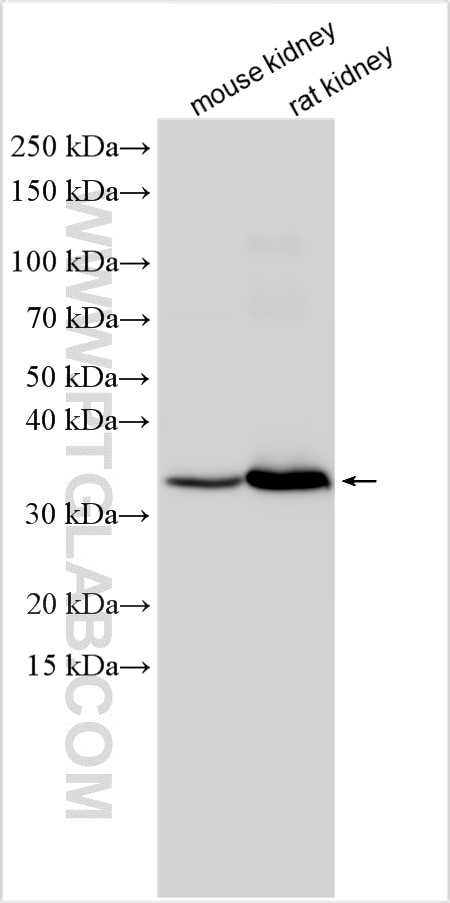HOGA1 Polyclonal antibody
HOGA1 Polyclonal Antibody for WB, ELISA
Host / Isotype
Rabbit / IgG
Reactivity
Human, mouse, rat
Applications
WB, ELISA
Conjugate
Unconjugated
Cat no : 27755-1-AP
Synonyms
Validation Data Gallery
Tested Applications
| Positive WB detected in | mouse kidney tissue, rat kidney tissue |
Recommended dilution
| Application | Dilution |
|---|---|
| Western Blot (WB) | WB : 1:2000-1:12000 |
| It is recommended that this reagent should be titrated in each testing system to obtain optimal results. | |
| Sample-dependent, Check data in validation data gallery. | |
Product Information
27755-1-AP targets HOGA1 in WB, ELISA applications and shows reactivity with Human, mouse, rat samples.
| Tested Reactivity | Human, mouse, rat |
| Host / Isotype | Rabbit / IgG |
| Class | Polyclonal |
| Type | Antibody |
| Immunogen | HOGA1 fusion protein Ag26849 相同性解析による交差性が予測される生物種 |
| Full Name | chromosome 10 open reading frame 65 |
| Observed molecular weight | 35 kDa |
| GenBank accession number | BC045550 |
| Gene symbol | HOGA1 |
| Gene ID (NCBI) | 112817 |
| Conjugate | Unconjugated |
| Form | Liquid |
| Purification Method | Antigen affinity purification |
| Storage Buffer | PBS with 0.02% sodium azide and 50% glycerol pH 7.3. |
| Storage Conditions | Store at -20°C. Stable for one year after shipment. Aliquoting is unnecessary for -20oC storage. |
Background Information
HOGA1 (4-hydroxy-2-oxoglutarate aldolase), also known as C10orf65, DHDPSL, is a mitochondrial enzyme that plays a gatekeeper role in hydroxyproline metabolis. HOGA1 is primarily expressed in liver and kidney and catalyzes the final step of mitochondrial hydroxyproline metabolism\ from 4-hydroxy-2-oxoglutarate to glyoxylate and pyruvate (PMID: 31696211). Identification of mutations in the HOGA1 gene as the cause of autosomal recessive primary hyperoxaluria (PH) type III has revitalized research in the field of PH and related stone disease (PMID: 22781098).
Protocols
| Product Specific Protocols | |
|---|---|
| WB protocol for HOGA1 antibody 27755-1-AP | Download protocol |
| Standard Protocols | |
|---|---|
| Click here to view our Standard Protocols |


